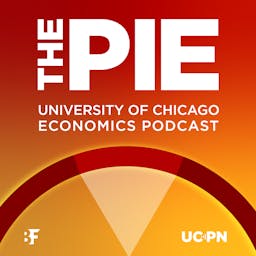

The Pie: An Economics Podcast
Becker Friedman Institute at UChicago
Economists are always talking about The Pie – how it grows and shrinks, how it’s sliced, and who gets the biggest shares. Join host Tess Vigeland as she talks with leading economists from the University of Chicago about their cutting-edge research and key events of the day. Hear how the economic pie is at the heart of issues like the aftermath of a global pandemic, jobs, energy policy, and more.
Episodes
Mentioned books

8 snips
May 1, 2025 • 49min
An Extra Slice of the Pie: Choosing with Uncertainty
Lars Peter Hansen, a Nobel Prize-winning economist and expert in uncertainty, dives into the complexities of decision-making amidst unpredictability. He discusses how policymakers can navigate uncertainty and the implications of declining public trust in scientific authority. The conversation explores the balance required in climate change decisions, weighing immediate action against the need for more information. Hansen also reflects on the importance of transparent communication in science to enhance public confidence and improve decision-making in challenging contexts.

Apr 29, 2025 • 27min
Tariffs, Trust, and the Twilight of Norms: U.S.–China Relations in the Trump Era
In this engaging conversation, economist Chang-Tai Hsieh from the University of Chicago explores the breakdown of trust in U.S.-China economic norms during the Trump administration. He discusses the struggles of China's post-COVID recovery and how U.S. tariffs have unexpectedly lessened their impact. Hsieh even suggests that Canada might face economic aggression instead of China. The dialogue highlights the implications of political rhetoric on economic relationships, raising concerns about global stability in an increasingly transactional world.

Apr 15, 2025 • 25min
War Economies: How Ukraine and Russia Are Adapting in Year Three
In a deep dive with Konstantin Sonin, a John Dewey Distinguished Service Professor at the University of Chicago, listeners gain insight into the stark economic realities reshaping Ukraine and Russia post-invasion. Sonin discusses Ukraine's resilience and innovative defense production amid war, while reflecting on shifting attitudes towards U.S. support. He also examines how Russia's economy withstands sanctions and the geopolitical implications of its energy sales to India and China, hinting at what the future might hold for both nations.

Apr 1, 2025 • 46min
Crypto’s Fatal Flaw: Trust, Scale, and the Economics of Blockchain
Eric Budish, a distinguished Professor of Economics at the University of Chicago, explores the paradoxes of cryptocurrency. He discusses how permissionless consensus, while innovative, introduces vulnerabilities like majority attacks. The conversation contrasts trust dynamics in traditional banking versus cryptocurrencies, examining energy costs and economic limits of decentralized finance. Budish also shares insights on market bubbles and the complexities of investing in Bitcoin, all while reminiscing about his culinary favorites, including pie.

Mar 18, 2025 • 31min
Will They or Won't They? A Former Fed Official on This Week’s Interest Rate Decision
This week, the Federal Reserve's Open Market Committee meets to decide whether to adjust interest rates or keep them steady. What should we expect amid today's economic and political uncertainty? On this episode of The Pie, Randy Kroszner, former Federal Reserve Governor and Norman R. Bobins Professor of Economics at the Booth School of Business, discusses the factors influencing the Fed’s decision.

Mar 14, 2025 • 28min
Should Performance Reviews Be Scrapped?
Stacey Kole, an Economist at Chicago Booth and expert in workplace management, joins the discussion on the value of performance reviews. She highlights the anxiety caused by traditional evaluations and questions their overall effectiveness. Through engaging case studies, she advocates for clearer objectives and a collaborative approach to performance assessments. Kole argues for frequent communication between managers and employees to foster meaningful feedback, ultimately linking individual performance to the organization's mission.

Mar 4, 2025 • 31min
The Future of U.S. Energy Policy Under Trump
In this conversation, Ryan Kellogg, the Ralph and Mary Otis Isham Professor at the Harris School of Public Policy and an expert in energy policy, dives into the implications of Trump's declared "national energy emergency." He discusses the potential impact of tariffs on Canadian oil and the future of fuel efficiency standards. Kellogg explores how these actions might influence gas prices, renewable energy adoption, and the U.S. transition to electric vehicles, all while reflecting on the significance of recent tax credits in shaping the energy landscape.

Feb 18, 2025 • 43min
The Economics of Health Insurance: Denials, Pre-Authorizations, and Cost Control
Josh Gottlieb, a health economics expert, discusses the burdens of insurance denials on healthcare providers. Zarek Brot-Goldberg delves into how pre-authorizations affect prescription drug choices in Medicare, highlighting the complexity patients face. Maggie Shi reveals the influence of waste-reduction programs in Medicare on both government spending and healthcare practices. Together, they unpack the bureaucratic challenges in the U.S. healthcare system, emphasizing the need for transparency and improved patient access to essential care.

Feb 4, 2025 • 26min
Powering Innovation: How Government Subsidies Accelerate Electric Vehicle Breakthroughs
Hyuk-soo Kwon, an Assistant Professor at the Harris School of Public Policy, discusses the critical role of government subsidies in advancing electric vehicle (EV) innovation. He highlights how nations like Norway and China leverage incentives to reshape vehicle design and production dynamics. Kwon sheds light on the importance of established expertise in driving breakthroughs and reflects on the implications of U.S. policy shifts. He also shares his academic journey and passion for the EV industry, emphasizing mentorship in his career development.

Jan 21, 2025 • 30min
Five Years Later: How COVID-19 Reshaped Our Economy and Lives
Matt Notowidigdo, a Professor of Economics at the University of Chicago Booth School, shares insights on how COVID-19 reshaped our economy. He discusses the rapid recovery in the labor market and the rise of remote work. Lockdowns presented a dilemma between health and economic costs, especially regarding children's education. Notowidigdo also uncovers paradoxical health trends during recessions and reflects on the long-term implications for the economy and immigration. The conversation blends serious analysis with light-hearted stories about learning and personal growth.


